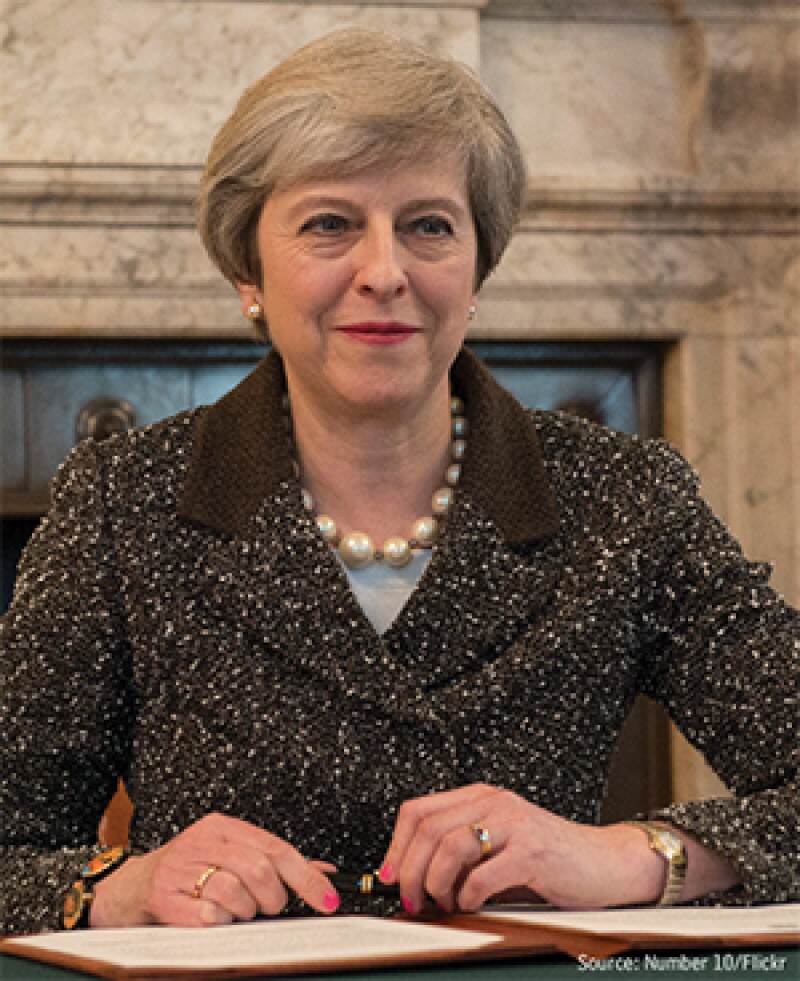
|
Theresa May was also in the Global Tax 50 2016 |
A great deal has changed since Theresa May became the UK's Prime Minister. In the aftermath of the referendum on June 23 2016, the Conservative government has faced the challenge of tough negotiations with the EU over Brexit, and the ruling party was shaken to its core by this year's election, which did not go to plan.
Prime Minister May surprised the country and called for a snap election. She hoped to gain a secure "strong and stable" majority to strengthen her hand in the upcoming talks with the EU. It was widely predicted that the Conservative Party could win a solid majority of 30 to 50 seats. Some even predicted a super-majority of at least 90 seats. But it was not to be.
Instead of a landmark victory, the Conservatives lost the majority they had secured in the 2015 election. The Labour Party increased its vote by more than 9.6 percentage points and won 29 seats, including some once safe Conservative seats. As a result, May was left with a far weaker hand and many expected her to step down – but she secured a deal with the Democratic Unionist Party (DUP) to hold on to power.
Many of the pledges in the Conservative Manifesto have been dropped as the ruling party tries to avoid votes which it could lose. This was the reasoning behind the cautious autumn budget. Chancellor Philip Hammond was eager to steer away from certain disaster, given that the last two budgets were not well received.
At the same time, the UK's withdrawal from the EU may mean more tax competition in the future. If the 'race to the bottom' continues, the British plan to cut corporation tax to 17% by 2020 could help drive down rates across the EU. There are already initiatives in France to lower the corporate rate to 25%, while the US is pursuing a 20% rate (see page 57).
Yet the issues of cutting corporate tax might be simple compared to the implications for VAT and customs duties. A regional shift in how the profits of large companies are taxed is one thing, but a split over VAT and customs would have cost British business dearly in terms of access to supply chains. This is one reason why the May government has moved towards 'full alignment' with the customs union to avoid the potential chaos of a total break with EU regulations.
The Treasury has considered revising the VAT threshold for businesses in the UK, which might help align the system with the EU. The proposal has been put off, so the threshold will remain unchanged until 2019. This is convenient timing given the schedule for the UK's exit – but does nothing to ease business uncertainty in the meantime.
The Irish border (see page 39) was another major question on these terms because Northern Ireland is heavily integrated with the Irish economy and the UK's membership of the single market and the customs union guarantees the free flow of goods, capital and labour. It's not just a matter of trade relations either, as the question of a land border versus a sea border was bound to feed back into old sectarian divides.
So the UK and the EU reached a compromise, whereby there would be no new border between Ireland and the UK, but the UK government will seek to keep the UK aligned with the rules of the single market and customs union. This was one way to give the business community the certainty it needs to plan for the years ahead.
What awaits Theresa May in 2018 may be unclear, but the only certainty is more haggling over the terms of a post-Brexit trade deal. The lifespan of a minority government in the UK historically ranges from six to 18 months, but these are exceptional times. Without an obvious rival, either internal or in opposition, May has already clung to power for a lot longer than expected.
The Global Tax 50 2017 |
|
|---|---|
The top 10 • Ranked in order of influence |
|
6. Arun Jaitley |
|
The remaining 40 • In alphabetic order |
|
| The Estonian presidency of the Council of the European Union |
|
| International Consortium of Investigative Journalists (ICIJ) |
|
| United Nations Committee of Experts on International Cooperation in Tax Matters |
|









